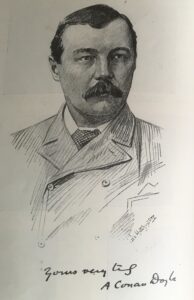Article Summary by Anne Chapman
 Arthur Conan Doyle’s medical and writing careers intertwined (highlighted most recently by the current BBC programme Killing Sherlock: Lucy Worsley on the Case of Conan Doyle) and his work has a history of being read in the light of his medical expertise. He wrote at a time when the professionalisation and specialisation of medicine had resulted in an increasing distance between the profession and the public, yet general practitioners relied financially on maintaining good relationships with their patients and popular medical journalism proliferated. A variety of contrasting voices often disseminated narratives of medical science. These conflicting developments raised questions of authority and expertise in relation to the construction of medicine in the popular imagination: how is knowledge constructed? Who should disseminate it? How and by whom is authority conferred? How can the general population judge experts in medical science? These are questions explored more widely in Conan Doyle’s writing as he examines the relationship between expertise and authority. In the early 1890s, Conan Doyle wrote for the popular, mass-market periodical The Idler: An Illustrated Magazine. His contributions to it address these questions of authority and expertise for a lay audience. First establishing the medical context of doctor/patient relationships in which these questions arose, this article undertakes a close reading of these mostly rarely studied single-issue stories and articles as a means of ascertaining how Conan Doyle and his illustrators identified the relationship between competing narratives, expertise and authority. It argues that rather than maintaining a distance between public and professional, Conan Doyle’s illustrated work demonstrates to his readers that there are ways to successfully navigate the appearance of authority and recognise expertise as they confront entangled representations of advances in medical science.
Arthur Conan Doyle’s medical and writing careers intertwined (highlighted most recently by the current BBC programme Killing Sherlock: Lucy Worsley on the Case of Conan Doyle) and his work has a history of being read in the light of his medical expertise. He wrote at a time when the professionalisation and specialisation of medicine had resulted in an increasing distance between the profession and the public, yet general practitioners relied financially on maintaining good relationships with their patients and popular medical journalism proliferated. A variety of contrasting voices often disseminated narratives of medical science. These conflicting developments raised questions of authority and expertise in relation to the construction of medicine in the popular imagination: how is knowledge constructed? Who should disseminate it? How and by whom is authority conferred? How can the general population judge experts in medical science? These are questions explored more widely in Conan Doyle’s writing as he examines the relationship between expertise and authority. In the early 1890s, Conan Doyle wrote for the popular, mass-market periodical The Idler: An Illustrated Magazine. His contributions to it address these questions of authority and expertise for a lay audience. First establishing the medical context of doctor/patient relationships in which these questions arose, this article undertakes a close reading of these mostly rarely studied single-issue stories and articles as a means of ascertaining how Conan Doyle and his illustrators identified the relationship between competing narratives, expertise and authority. It argues that rather than maintaining a distance between public and professional, Conan Doyle’s illustrated work demonstrates to his readers that there are ways to successfully navigate the appearance of authority and recognise expertise as they confront entangled representations of advances in medical science.
Read the full article on the Medical Humanities journal website.
Anne Chapman researches nineteenth-century literature and culture, with interests in periodicals, genre, and the cultural history of public health. She co-edited the collection Coding and Representation from the Nineteenth Century to the Present: Scrambled Messages with Natalie Hume. She teaches at Glasgow Caledonian University’s London campus and previously taught at King’s College London, where she completed her PhD.